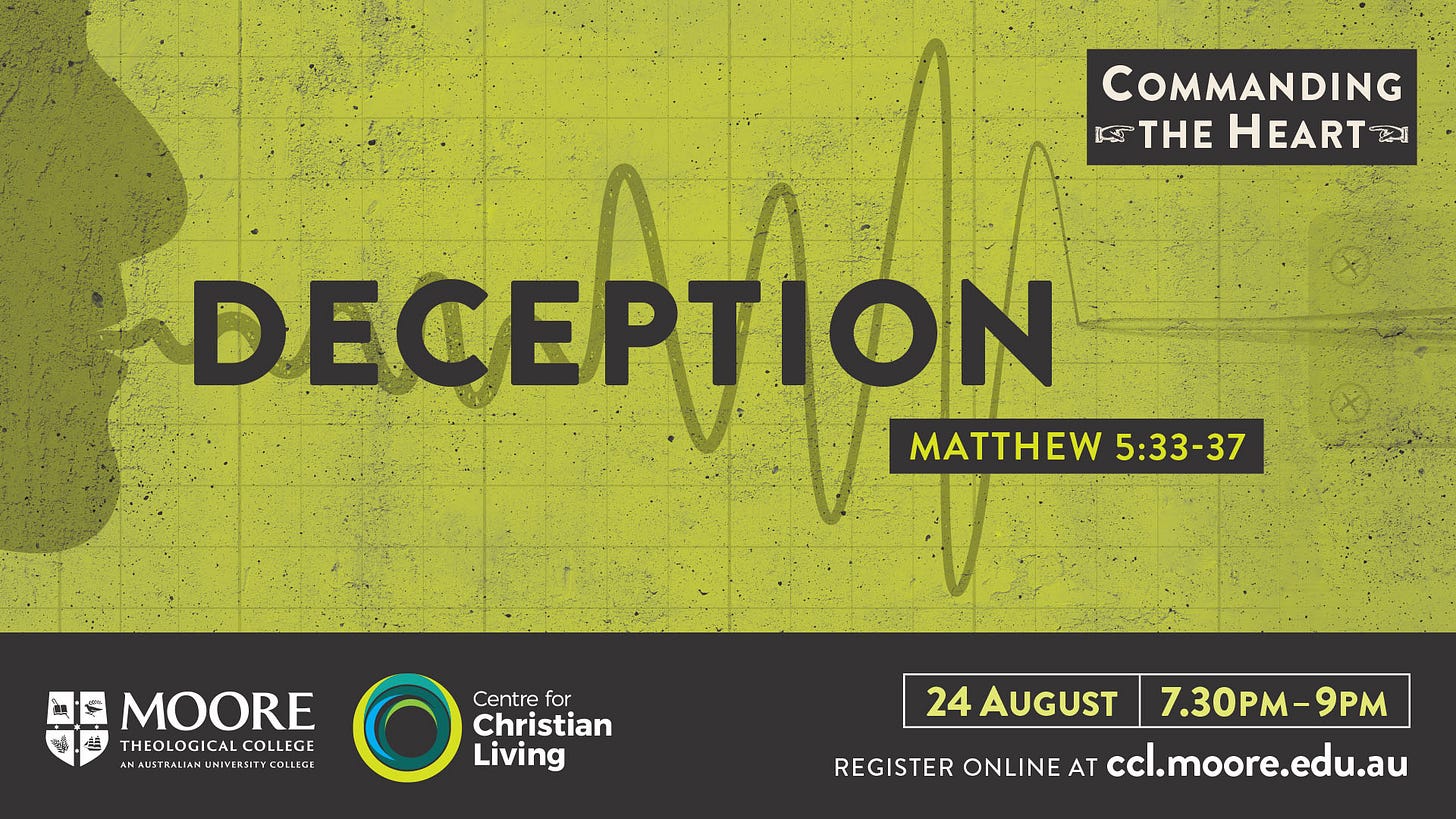Hi everyone
Before getting onto this week’s topic, another ‘uncommonly good’ prayer to share with you from The Book of Common Prayer. James wrote in to mention two of his favourites:
I do quite like the collect for peace, and especially the phrase ‘whose service is perfect freedom’. It’s a refreshing reminder of how God’s call to freedom and our world’s modern conception of freedom aren’t the same thing. Another favourite is the Collect for the Twelfth Sunday after Trinity, and especially the line: ‘… God, who art always more ready to hear than we to pray’. What a wonderful reminder, and rebuke, about our heavenly Father’s willingness to hear from his children!
Here’s the full prayer of which that line is part:
Almighty and everlasting God, who art always more ready to hear than we are to pray, and art wont to give more than either we desire or deserve: Pour down upon us the abundance of thy mercy; forgiving us those things whereof our conscience is afraid, and giving us those good things which we are not worthy to ask, but through the merits and mediation of Jesus Christ, thy Son, our Lord. Amen
Wonderful stuff.
Gospel clarity
There are many possible reasons for a lack of vitality in a church, which of course gives plenty of scope for experts to provide solutions. It could be your structures or programs or staffing mix or welcoming or preaching or lack of discipline or prayerlessness or who knows what combination of these things and many others. Plus there’s the small matter of God’s sovereign hand.
But being a so-called expert myself—on the basis of having helped Col Marshall write a little book about trellises and vines a few years ago—I’ve got another factor to throw into the mix.
It may sound ridiculous, but one simple reason that churches and ministries languish is that they don’t teach the gospel with clarity.
‘Well of course,’ I hear you say, ‘those liberal and heretical and other sub-orthodox kind of places don’t teach the gospel. That’s why most of them are declining and dying.’
True enough, but I’m talking about good solid Bible-teaching evangelical churches. Quite possibly your church.
‘Really?’ you respond. ‘That’s hard to believe. Every second sermon at our church mentions that Jesus died for our sins, that justification is by faith alone, and that salvation comes from God’s free grace not our works. We sing about it; we remember it in the Lord’s Supper. Surely if there’s one thing we all know back to front, it’s that!’
Like I said, a lack of gospel clarity.
It’s certainly true and of prime importance that Jesus died a substitutionary death for our sins, and that forgiveness and salvation and justification flow directly from that fount of every blessing. But to know these truths is not yet to know the gospel with clarity. Not the New Testament gospel anyway.
The big newsflash announcement (or ‘gospel’) of the New Testament is not that Jesus died on the cross for your sins. It’s that the Jesus who died on the cross for sins rose again as the Lord and Christ of the world, and now offers forgiveness and salvation and eternal life to all those who repent and submit to his rule in faith.
That’s what the apostles went around proclaiming. (Have a read of Acts and see for yourself.)
Their big announcement was that the crucified Jesus had been raised by God and thus proven and declared to be the ‘Christ’—God’s promised worldwide ruler and judge in the line of David, whom death could not defeat and who would reign forever over God’s kingdom. When we see the title ‘Christ’ given to Jesus, this is what is being claimed about him.
The gospel, then, is not ‘Jesus crucified’, but ‘Jesus Christ and him crucified’ (1 Cor 2:2). The One who was crucified has now risen as God’s worldwide-king-and-judge (‘Christ’). He now calls on everyone in the world to turn back to him in repentance and to receive forgiveness of sins on the basis of his atoning death.
Would you say that the members of your church have this understanding of the gospel clearly in their heads? That they could explain to you without hesitation how the death of Jesus for sins and the resurrection of Jesus as the Lord Christ fit together, and how this ‘gospel’ calls not just for faith but for repentance leading to obedience?
In my fairly long and wide experience of church life and ministry in evangelical churches in Australia and the US, I would say that disturbingly few everyday Christians grasp these truths with clarity. Whenever I run Two Ways to Live training or workshops, and ask people at the beginning to trot out their existing nutshell gospel, it hardly ever mentions the resurrection—and if it does, it’s with very little understanding of its significance in establishing Jesus as the living Lord and Christ of the world.
We need to teach our people this gospel, and clearly. We need to teach it and remind them of it because, as Paul says in 1 Corinthians 15:1-5, this Scripture-fulfilling message about the atoning death and resurrection of the Christ is the word of first importance; it’s the word in which we stand and by which we are being saved. It’s the basis of everything.
When we grasp this gospel clearly, and it penetrates our hearts and wills and lives, the effects are life-changing. This gospel has a power to save and to transform, because it speaks not just of a forgiven past through an atoning death, but also of a new, joyous, constantly repentant future, lived under the lordship of the living Christ.
This gospel drives us to pursue holiness—we now live a completely new life under the lordship of the risen Christ. We are now raised with him, and so put off everything that belongs to our old earthly selves and put on the new life of the resurrection age (Col 3:1-17).
This gospel gives assurance and hope, because we know that the one who died to justify us by his blood now lives and reigns as God’s Christ, and will surely save us from God’s wrath on that last day (Rom 5:6-11).
This gospel motivates evangelism—because if the risen Christ is the lord and judge of every person in the world (Acts 17:30-31), then every person in the world needs to hear his offer of salvation and turn back to him in repentance and faith to live under his lordship.
This gospel changes our hearts to serve one another gladly in love. It brings us into fellowship and communion with all those others who have been saved by the living Christ and now serve and obey him. Our new life in him is one that follows his example—that lays down its life for others, knowing that this is the path to glory.
The gospel of the crucified Christ lights a fire under the Christian life. It ignites and fans into flame the various marks of a flourishing Christian disciple and of a healthy church—that we grow in godliness and holiness, that we persevere in joy and assurance, that we are driven to reach out to the world in mission and evangelism, and that we love and serve one another and all people, as God has served us in his Son.
Could it be true? Could the significant factor in the lack of spiritual heat in our lives and churches be a lack of clarity about this gospel?
I strongly suspect so.
It seems beyond obvious to me that we should be clearly and intentionally teaching this New Testament gospel to everyone in our churches.
I’m not saying this, I should add, because I’ve recently written a resource to help churches do just that. It’s the other way round—I wrote Learn the Gospel (and am excited about its potential) because I’m convinced of the power of gospel in all its clarity to penetrate and change and save human hearts.
But in whatever way we do it—through sermons, seminars, weekend conferences, books, small group material, training material, and so on—we need to teach the powerful New Testament gospel—with clarity.
PS
Like me, I know a number of you have been waiting patiently for the release of the new Two ways to live training material that I’ve mentioned often over the past eighteen months or so. The first part of it—Learn the Gospel—is now tantalizingly close. The books have been printed and are currently being shipped back to Matthias Media; the videos are undergoing final checks; as of this moment the official release date is August 1, but stock may be available sooner than that. I’ll let you know soon as I know! (You can pre-order here.)
I’m excited to see it finally coming to fruition, not just for the natural reasons (of seeing a long-running project approaching the finish line), but because of the topic explored in this week’s post. The more clearly and deeply the gospel is lodged in our hearts, the healthier and more productive is our discipleship and our church life. I’m praying that God will use this new resource to help with that!
As many of you know, I used to work at The Centre for Christian Living at Moore College, and I am still a keen supporter of their work. In fact, I’m speaking at the CCL event on August 24 on the topic of ‘Deception’. Come along to Moore College in person, or tune in to the livestream. Click here for all the details and to register online.












